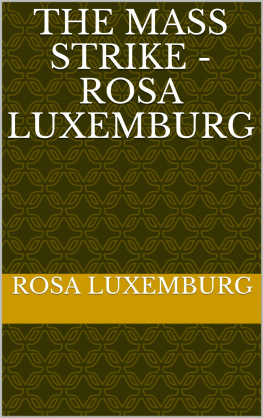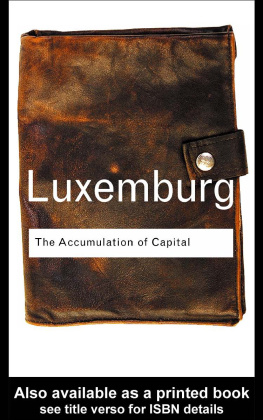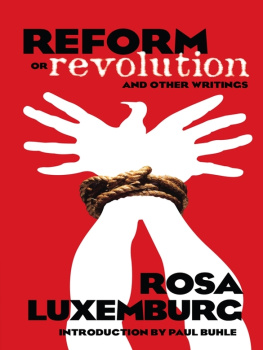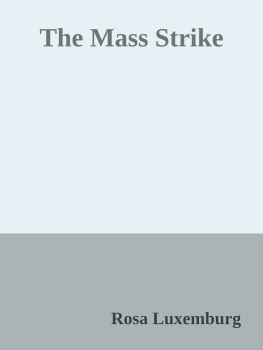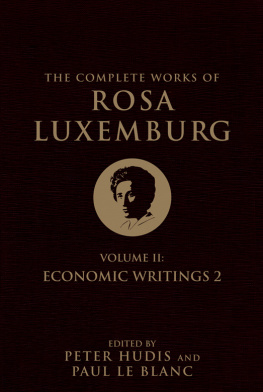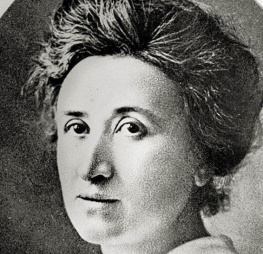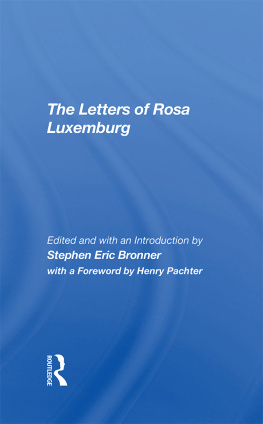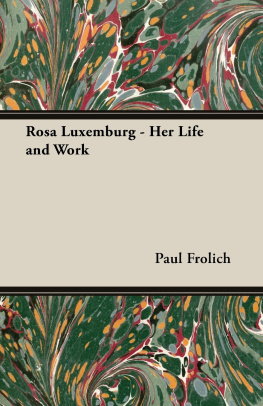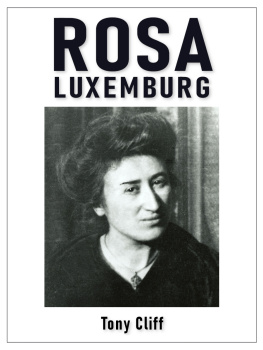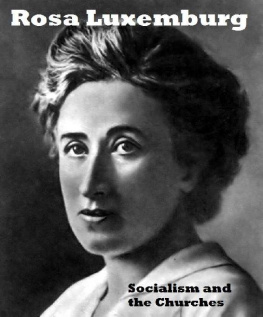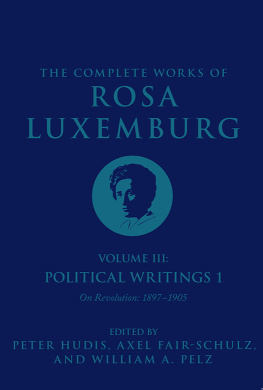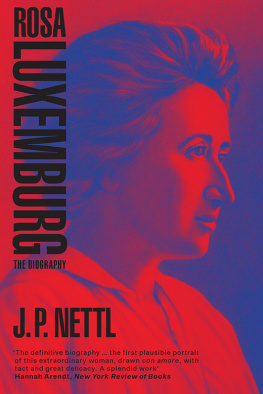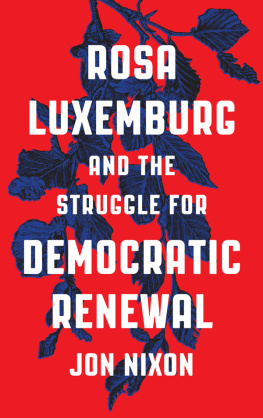Rosa Luxemburg - The Mass Strike
Here you can read online Rosa Luxemburg - The Mass Strike full text of the book (entire story) in english for free. Download pdf and epub, get meaning, cover and reviews about this ebook. year: 1971, publisher: Harper & Row, genre: Politics. Description of the work, (preface) as well as reviews are available. Best literature library LitArk.com created for fans of good reading and offers a wide selection of genres:
Romance novel
Science fiction
Adventure
Detective
Science
History
Home and family
Prose
Art
Politics
Computer
Non-fiction
Religion
Business
Children
Humor
Choose a favorite category and find really read worthwhile books. Enjoy immersion in the world of imagination, feel the emotions of the characters or learn something new for yourself, make an fascinating discovery.
- Book:The Mass Strike
- Author:
- Publisher:Harper & Row
- Genre:
- Year:1971
- Rating:4 / 5
- Favourites:Add to favourites
- Your mark:
- 80
- 1
- 2
- 3
- 4
- 5
The Mass Strike: summary, description and annotation
We offer to read an annotation, description, summary or preface (depends on what the author of the book "The Mass Strike" wrote himself). If you haven't found the necessary information about the book — write in the comments, we will try to find it.
The Mass Strike — read online for free the complete book (whole text) full work
Below is the text of the book, divided by pages. System saving the place of the last page read, allows you to conveniently read the book "The Mass Strike" online for free, without having to search again every time where you left off. Put a bookmark, and you can go to the page where you finished reading at any time.
Font size:
Interval:
Bookmark:
and the Trade Unions
Written and first published: 1906.
Source: The Mass Strike, the Political Party and the Trade Unions by Rosa Luxemburg.
Publisher: Marxist Educational Society of Detroit, 1925.
Translated: Patrick Lavin.
Online Version: Rosa Luxemburg Internet Archive (marxists.org) 1999.
Transcription/Markup: A. Lehrer.
Ebook Conversion: Dave Allinson, 2015.
Available online at:
https://www.marxists.org/archive/luxemburg/1906/mass-strike/index.htm
Almost all works and pronouncements of international socialism on the subject of the mass strike date from the time before the Russian Revolution [of 1905], the first historical experience on a very large scale with the means of struggle. It is therefore evident that they are, for the most part, out-of-date. Their standpoint is essentially that of Engels who in 1873 wrote as follows in his criticism of the revolutionary blundering of the Bakuninists in Spain:
The general strike, in the Bakuninists program, is the lever which will be used for introducing the social revolution. One fine morning all the workers in every industry in a country, or perhaps in every country, will cease work, and thereby compel the ruling class either to submit in about four weeks, or to launch an attack on the workers so that the latter will have the right to defend themselves, and may use the opportunity to overthrow the old society. The proposal is by no means new: French and Belgian socialists have paraded it continually since 1848, but for all that is of English origin. During the rapid and powerful development of Chartism among the English workers that followed the crisis of 1837, the holy month a suspension of work on a national scale was preached as early as 1839, and was received with such favour that in July 1842 the factory workers of the north of England attempted to carry it out. And at the Congress of the Alliancists at Geneva on September 1, 1873, the general strike played a great part, but it was admitted on all sides to carry it out it was necessary to have a perfect organisation of the working-class and a full war chest. And that is the crux of the question. On the one hand, the governments, especially if they are encouraged by the workers abstention from political action, will never allow the funds of the workers to become large enough, and on the other hand, political events and the encroachments of the ruling class will bring about the liberation of the workers long before the proletariat gets the length of forming this ideal organisation and this colossal reserve fund. But if they had these, they would not need to make use of the roundabout way of the general strike in order to attain their object.
Here we have the reasoning that was characteristic of the attitude of international social democracy towards the mass strike in the following decades. It is based on the anarchist theory of the general strike that is, the theory of the general strike as a means of inaugurating the social revolution, in contradistinction to the daily political struggle of the working-class and exhausts itself in the following simple dilemma: either the proletariat as a whole are not yet in possession of the powerful organisation and financial resources required, in which case they cannot carry through the general strike; or they are already sufficiently well organised, in which case they do not need the general strike. This reasoning is so simple and at first glance so irrefutable that, for a quarter of a century, it has rendered excellent service to the modern labour movement as a logical weapon against the anarchist phantom and as a means of carrying out the idea of political struggle to the widest circles of the workers. The enormous strides taken by the labour movement in all capitalist countries during the last twenty-five years are the most convincing evidence of the value of the tactics of political struggle, which were insisted upon by Marx and Engels in opposition to Bakuninism; and German social democracy, in its position of vanguard of the entire international labour movement is not in the least the direct product of the consistent and energetic application of these tactics.
The [1905] Russian Revolution has now effected a radical revision of the above piece of reasoning. For the first time in the history of the class struggle it has achieved a grandiose realisation of the idea of the mass strike and as we shall discuss later has even matured the general strike and thereby opened a new epoch in the development of the labour movement. It does not, of course, follow from this that the tactics of political struggle recommended by Marx and Engels were false or that criticism applied by them to anarchism was incorrect. On the contrary, it is the same train of ideas, the same method, the Engels-Marxian tactics, which lay at the foundation of the previous practice of the German social democracy, which now in the Russian Revolution are producing new factors and new conditions in the class struggle. The Russian Revolution, which is the first historical experiment on the model of the class strike, not merely does not afford a vindication of anarchism, but actually means the historical liquidation of anarchism. The sorry existence to which this mental tendency was condemned in recent decades by the powerful development of social democracy in Germany may, to a certain extent, be explained by the exclusive domination and long duration of the parliamentary period. A tendency patterned entirely upon the first blow and direct action, a tendency revolutionary in the most naked pitchfork sense, can only temporarily languish in the calm of parliamentarian day and, on a return of the period of direct open struggle, can come to life again and unfold its inherent strength.
Russia, in particular, appeared to have become the experimental field for the heroic deeds of anarchism. A country in which the proletariat had absolutely no political rights and extremely weak organisations, a many-coloured complex of various sections of the population, a chaos of conflicting interests, a low standard of education amongst the masses of the people, extreme brutality in the use of violence on the part of the prevailing regime all this seemed as if created to raise anarchism to a sudden if perhaps short-lived power. And finally, Russia was the historical birthplace of anarchism. But the fatherland of Bakunin was to become the burial-place of his teachings. Not only did and do the anarchists in Russia not stand at the head of the mass strike movement; not only does the whole political leadership of revolutionary action and also of the mass strike lie in the hands of the social democratic organisations, which are bitterly opposed as bourgeois parties by Russian anarchists, or partly in the hands of such socialist organisations as are more or less influenced by the social democracy and more or less approximate to it such as the terrorist party, the socialist revolutionaries but the anarchists simply do not exist as a serious political tendency in the Russian Revolution. Only in a small Lithuanian town with particularly difficult conditions a confused medley of different nationalities among the workers, an extremely scattered condition of small-scale industry, a very severely oppressed proletariat in Bialystok, there is, amongst the seven or eight different revolutionary groups a handful of half-grown anarchists who promote confusion and bewilderment amongst the workers to the best of their ability; and lastly in Moscow, and perhaps in two or three other towns, a handful of people of this kidney make themselves noticeable.
But apart from these few revolutionary groups, what is the actual role of anarchism in the Russian Revolution? It has become the sign of the common thief and plunderer; a large proportion of the innumerable thefts and acts of plunder of private persons are carried out under the name of anarchist-communism acts which rise up like a troubled wave against the revolution in every period of depression and in every period of temporary defensive. Anarchism has become in the Russian Revolution, not the theory of the struggling proletariat, but the ideological signboard of the counter-revolutionary lumpenproletariat, who, like a school of sharks, swarm in the wake of the battleship of the revolution. And therewith the historical career of anarchism is well-nigh ended.
Font size:
Interval:
Bookmark:
Similar books «The Mass Strike»
Look at similar books to The Mass Strike. We have selected literature similar in name and meaning in the hope of providing readers with more options to find new, interesting, not yet read works.
Discussion, reviews of the book The Mass Strike and just readers' own opinions. Leave your comments, write what you think about the work, its meaning or the main characters. Specify what exactly you liked and what you didn't like, and why you think so.

